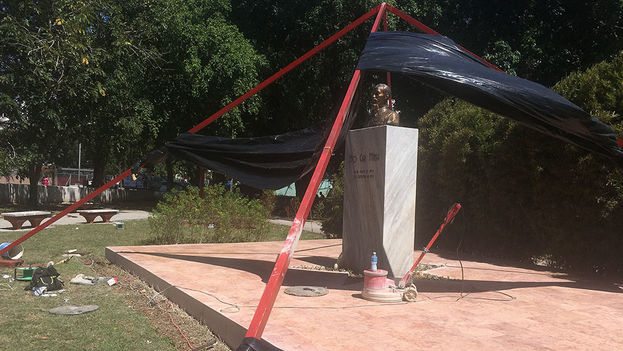
![]() 14ymedio, Havana, 16 May 2017 – A singular pyramidal structure – with metal bars painted red – attracts hardly any attention in a park on Avenida 26, almost directly across from the Acapulco Cinema in Havana. The composition includes a pedestal on which rests the bust dedicated to the Vietnamese leader Ho Chi Minh, virtually unknown to the youngest Cubans.
14ymedio, Havana, 16 May 2017 – A singular pyramidal structure – with metal bars painted red – attracts hardly any attention in a park on Avenida 26, almost directly across from the Acapulco Cinema in Havana. The composition includes a pedestal on which rests the bust dedicated to the Vietnamese leader Ho Chi Minh, virtually unknown to the youngest Cubans.
These days the monument is surrounded by the bustle of restoration in anticipation of the 127th birthday, on 19 May, of the man his supporters affectionately call “Uncle Ho.” The revitalization comes amid a climate of relaunching of relations between the island and Vietnam, following the signing this past March of a bilateral cooperation plan on defense.
Both governments, despite the differences that separate them economically, still have much in common. In April, the Vietnamese regime signed an agreement with Facebook where the social network giant committed to censoring content that violates the laws of the country and erasing accounts that publish “false content” about the authorities.
Very few nationals would spend one minute of their time on-line to find out who was the man of that lonely bust on 26th Street
On the island, meanwhile, the government of Raúl Castro gives access to the network in dribs and drabs through Wi-Fi zones with high navigation prices, censored sites and an unstable service. While Cuba lags with regards to connectivity in cyberspace, Vietnam has more than 45 million users of social networking.
In this world marked by hyperconnectivity, and despite the limitations of access, very few Cubans would spend one minute of their time on-line to find out who was the man of that lonely bust on 26th street. The most they know of him is that he had a reputation for being straightforward, that he wore sandals and that he never imagined the effect that the new technologies were going to have on the system he built.
